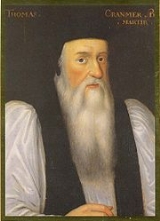
History of the Puritans
Encyclopedia
The history of the Puritans can be traced back to the first Vestments Controversy
in the reign of Edward VI
, the formation of an identifiable Puritan
movement in the 1560s and ends in a decline in the mid-18th century. It is a complex evolution, with the situation of the Puritans as a religious group in England changing almost decade by decade, as a consequence both of political shifts in their relationship to the state and the Church of England
, and of changing views of Puritans, both clergy and laity. It can not easily summarised, since the dramatic events of the 1640s, sometimes called the Puritan Revolution, have complex roots, any more than the term "Puritan" can be given a useful and precise definition outside the particular historical context.
Vestments controversy
The vestments controversy arose in the English Reformation, ostensibly concerning vestments, but more fundamentally concerned with English Protestant identity, doctrine, and various church practices...
in the reign of Edward VI
Edward VI of England
Edward VI was the King of England and Ireland from 28 January 1547 until his death. He was crowned on 20 February at the age of nine. The son of Henry VIII and Jane Seymour, Edward was the third monarch of the Tudor dynasty and England's first monarch who was raised as a Protestant...
, the formation of an identifiable Puritan
Puritan
The Puritans were a significant grouping of English Protestants in the 16th and 17th centuries. Puritanism in this sense was founded by some Marian exiles from the clergy shortly after the accession of Elizabeth I of England in 1558, as an activist movement within the Church of England...
movement in the 1560s and ends in a decline in the mid-18th century. It is a complex evolution, with the situation of the Puritans as a religious group in England changing almost decade by decade, as a consequence both of political shifts in their relationship to the state and the Church of England
Church of England
The Church of England is the officially established Christian church in England and the Mother Church of the worldwide Anglican Communion. The church considers itself within the tradition of Western Christianity and dates its formal establishment principally to the mission to England by St...
, and of changing views of Puritans, both clergy and laity. It can not easily summarised, since the dramatic events of the 1640s, sometimes called the Puritan Revolution, have complex roots, any more than the term "Puritan" can be given a useful and precise definition outside the particular historical context.
See
- History of the Puritans under Elizabeth IHistory of the Puritans under Elizabeth IThe reign of Elizabeth I of England, from 1558 to 1603, saw the rise of the Puritan movement in England, its clash with the authorities of the Church of England, and its temporarily effective suppression in the 1590s by severe judicial means.-Background, to 1559:...
, 1558–1603 - History of the Puritans under James IHistory of the Puritans under James IUnder James I of England, the Puritan movement co-existed with the conforming Church of England in what was generally an accepted form of episcopal Protestant religion...
, 1603–1625 - History of the Puritans under Charles IHistory of the Puritans under Charles IUnder Charles I of England, the Puritans became a political force as well as a religious tendency in the country. Opponents of the royal prerogative became allies of Puritan reformers, who saw the Church of England moving in a direction opposite to what they wanted, and objected to increased Roman...
, 1625–1649 - History of the Puritans from 1649History of the Puritans from 1649From 1649 to 1660 Puritans in England were allied to the state power held by the military regime, headed by Oliver Cromwell until his death in 1658. They broke into numerous sects, of which the Presbyterian group comprised most of the clergy, but was deficient in political power since Cromwell's...
- History of the Puritans in North AmericaHistory of the Puritans in North AmericaIn the early 17th century, thousands of English Puritans settled in North America, mainly in New England. Puritans were generally members of the Church of England who believed the Church of England was insufficiently Reformed and who therefore opposed royal ecclesiastical policy under Elizabeth I...

